#Epistemic Injustice
Explore tagged Tumblr posts
Text
The Third Sex
After months of research and painstakingly connecting the threads of transmisogyny theory, queer activism, and field-wide epistemic injustice, I would like to present "The Third Sex": my treatise on a third-world transfeminism.
#transfeminism#gender is a regime#materialist feminism#sex is a social construct#social constructionism#lesbian feminism#feminism#epistemicide#epistemic injustice#third sexing#racialized disposability#racialized transmisogyny#racialized misogyny#academic racism#racialization#transmisogyny#third world feminism#third world transfemiism
9K notes
·
View notes
Text
When I go onstage, I usually joke a lot. I joke on purpose, first of all because I want to believe I’m funny. But there’s another reason: Any Palestinians operating in the public eye, especially Palestinians who have suffered Israeli violence, are expected to behave a certain way. You are supposed to be miserable—head bowed, wailing and weak and asking for mercy. You’re supposed to be polite in your suffering. And I completely refuse this. I refuse these politics of appeal. I don’t want to appeal to anyone. I can experience travesty and tragedy, and profound loss, and I can still make a joke about it. And that is the full spectrum of Palestinian humanity—or human humanity at large. We are human not just because we cry when we lose our mothers, or when we lose our homes, or because we have pets or hobbies. We are humans because we feel rage and we feel disdain—because we resist.
And I am honestly grateful for my disdain, because it reminds me that I am human. I am grateful for my rage, because it reminds me of my ability to react naturally to injustice. I am grateful for the opportunity to be flippant, to satirize and ridicule my impenetrable, indelible occupier. So, I invite you all to interrogate your biases as you leave this lecture, to interrogate what makes you want to qualify a Palestinian’s humanity. And I invite you, again, to be brave.
Mohammed El-Kurd, The Right to Speak for Ourselves. [emphasis added]
742 notes
·
View notes
Text
as someone who was doing academic/professional research and applying to graduate school last year and is doing professional research and applying to graduate school this year the difference in how inaccessible research has become in just TWELVE MONTHS is STARK and so deeply felt. I am lucky enough to have someone’s institutional IDs but it’s insane how I needed that to write the most basic lit reviews/application materials when I spent the last ~5 years in a broke third world public university with almost no institutional access and managed just fine. the destruction and hobbling of sci-hub, libgen, internet archive, and other open source resources is nothing less than mass epistemic violence against global south students and it’s only going to compound every year as the materials these platforms have access to become increasingly dated.
#on academia#research#epistemic injustice#I started of my college career with my professors hand writing the link to libgen and sci-hub on the blackboard#I ended my academic career with my city’s high court essentially killing libgen#the decline has been exponential
74 notes
·
View notes
Text
#please use ur heads guys#uhc ceo#uhc shooter#uhc assassin#uhc#luigi mangione#luigi mangione manifesto#manifesto#us politics#politics#us healthcare#us health system#healthcare#brian thompson#uhc shooter manifesto#uhc assassin manifesto#us news#leftist politics#leftist#epistemology#epistemic injustice
31 notes
·
View notes
Text
It is possible to see how pre-emptive testimonial injustice and testimonial smothering contribute to ignorance regarding suicidal people's experiences, because their voices remain relatively absent from the public sphere or are transformed or adapted to be more "acceptable", in turn fostering hermeneutical injustice and leading to greater difficulty in theorizing suicidist oppression–and hence perpetuating the deadly silencing circle of epistemic violence.
— alexandre baril, suicidism: a new theoretical framework to conceptualize suicide from an anti-oppressive perspective
#suicidism#sanism#epistemic injustice#hermeneutical marginalization#anti oppression#anti psychiatry#anti psych#words words words#quote#quotes on tumblr#tw sui talk#tw suicidality#fountain pen
16 notes
·
View notes
Text
Why is there so much pain in this world? It is strange when you get to thinking about it.
It seems that we shouldn't have to hurt so much. So many things could be better, and when I have expressed this in the past, there are people who seem to get offended by it. That changing anything about the horror of all this is taboo somehow.
Or that changing anything is just an idealistic dream. Sure, there will always be pain in the world, I think. There will always be hurt and abusive people that know how to operate between the cracks. However, there is so much that seems could be done to make things better. Bad things are just allowed to proliferate within this system. So much of this current mode of production feeds off of human suffering that it boggles the mind that you could call this anywhere close to a democracy. Policies that are vastly unpopular with the majority of people are made into law without much of a fight from anyone that we are told are our representatives.
All the things that were considered public goods in the past not all that long ago are cast aside as more and more are privatized. The poor and the working class have to put up with more and more being taken away and a lower quality of life. When does it stop? When do the people gather their strength as one to not just make the demand, but to assert that certain things just should not be tolerated? Things such as child labor, genocide, exploitation of natural resources for private gain, colonial wars of domination, etc. We don't support these things that our governments do, but they keep on happening anyway.
It helps to not give in to too much pessimism. There have been gains in the past that led to positive outcomes. How do we make things happen that reflect the will and desires of the majority of people. It appears to me that what appears to us through the mediums advancing today are both a blessing and a curse. I worry that it is slowly becoming more and more negative though. How do you approach epistemological certainty in a world where technology is geared more and more towards surveillance, deception, coercion, etc.?
#questions#philosophy#anarchism#communism#marxism#socialism#anticapitalism#problems#privatization#inverted totalitarianism#protest#democracy#epistemology#epistemic injustice#ethics
7 notes
·
View notes
Text
DEIB and Their Adversaries
What are diversity, equity, inclusion, and belonging? What are their narrative adversaries? We provide a glossary of terms below. Follow the links for deeply sourced reference materials. DEIB diversity = a range of differences; variety equity = the process of redistributing access and opportunity to be fair and just; the state of being free of bias, discrimination, and identity-predictable…
#ableism#behaviorism#belonging#better get used to it#conquering gaze#deficit ideology#deib#diversity#epistemic injustice#equity#fairness#inclusion#meritocracy#power#resentment#scientism
2 notes
·
View notes
Text
This book is open access, which means that you have free and unlimited access
Discusses mental health issues in youth and elderly, addressing threats to epistemic justice in each life stage
Advocates for patients’ involvement as a key tool to reach epistemic justice in mental healthcare
Featuring entries from clinicians, psychologists, and philosophers, this collection is available online free of charge
2 notes
·
View notes
Quote
Savarnas often ask ‘would you go for treatment from a doctor who got medical seat using reservation?’ The whole narrative rests on testimonial injustice where the expertise of a DBA individual is discarded, despite having the degree and experience. Interestingly this argument will never be used for doctors who used EWS reservation or even paid management seats. The use of ‘Merit’ against reservation to undermine the intellect and capabilities of DBA community is the most popular example of epistemic injustice done on the community.
Pranav Jeevan, ‘Epistemic Injustice: Does Knowledge have Caste?’, Round Table India
#Round Table India#India#Pranav Jeevan#Savarnas#casteism#Dalits#Bahujans#Adivasis#EWS reservation#management quota#epistemic injustice#testimonial injustice#reservation
39 notes
·
View notes
Text
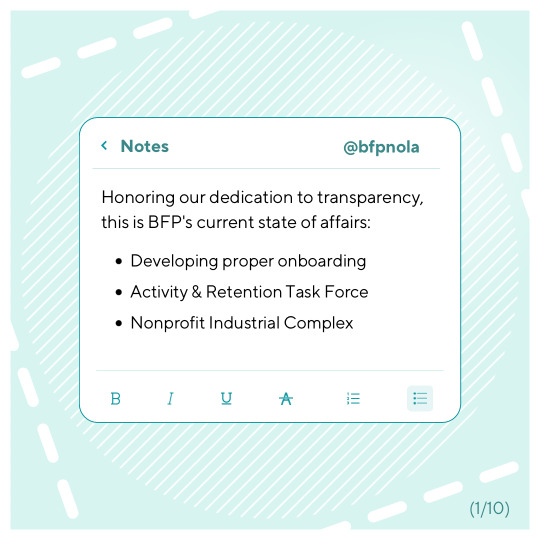
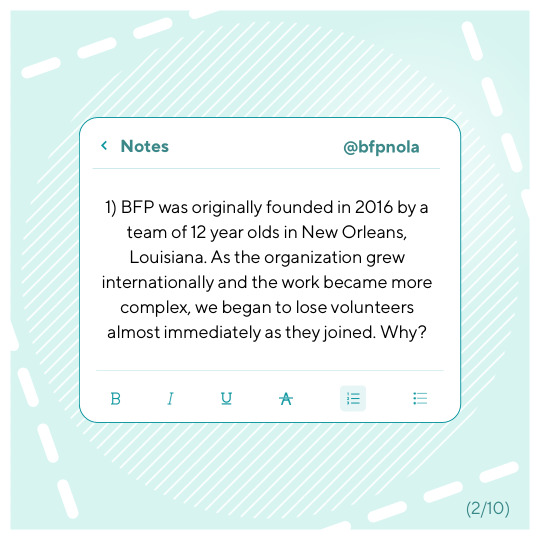
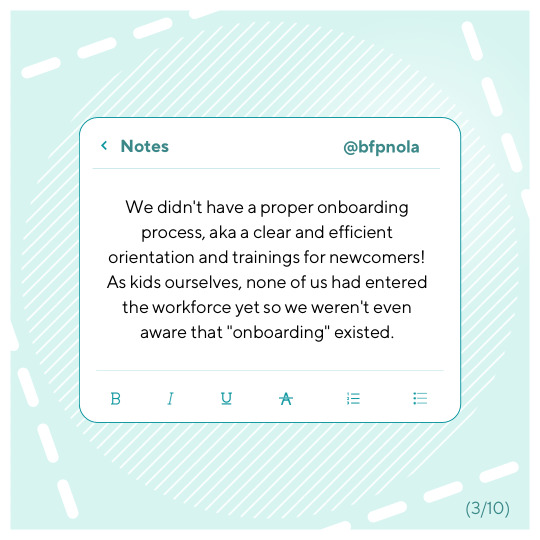
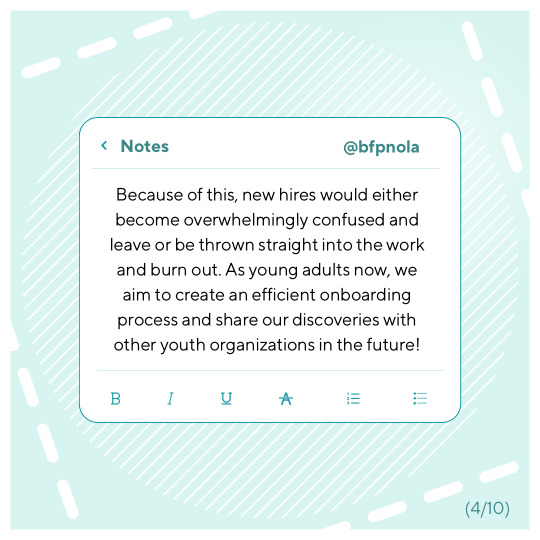
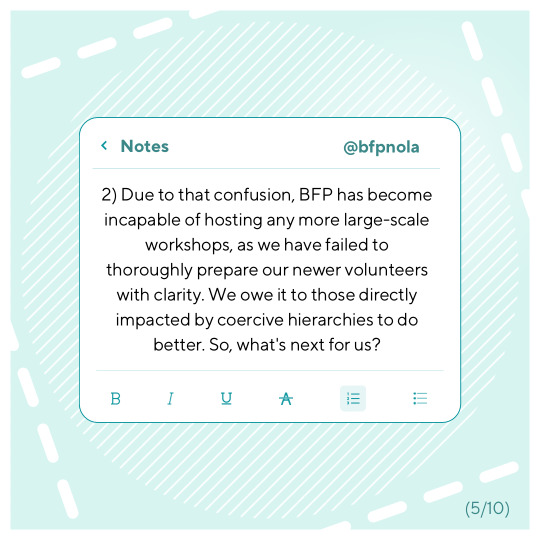
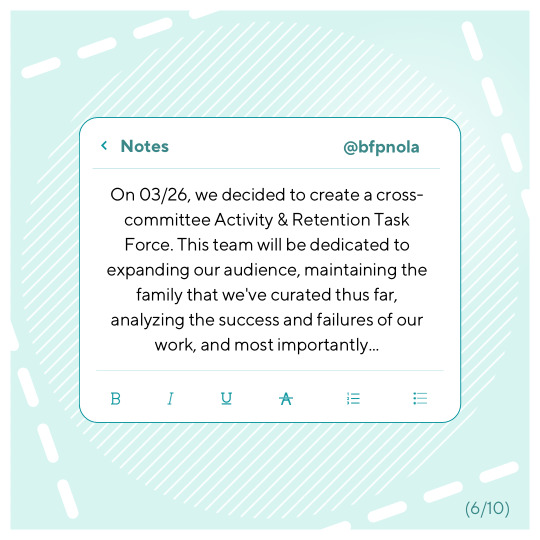
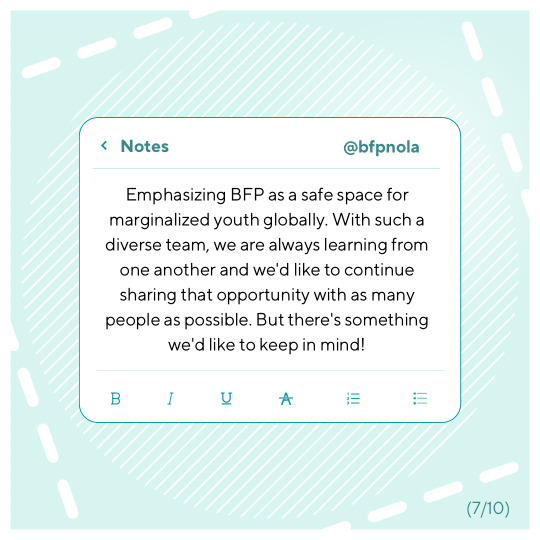
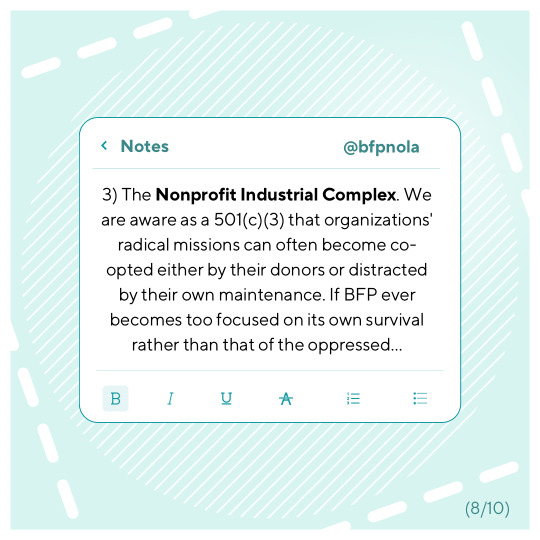
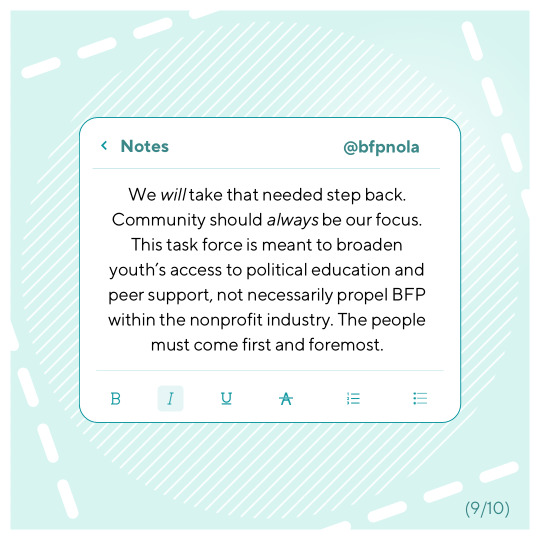
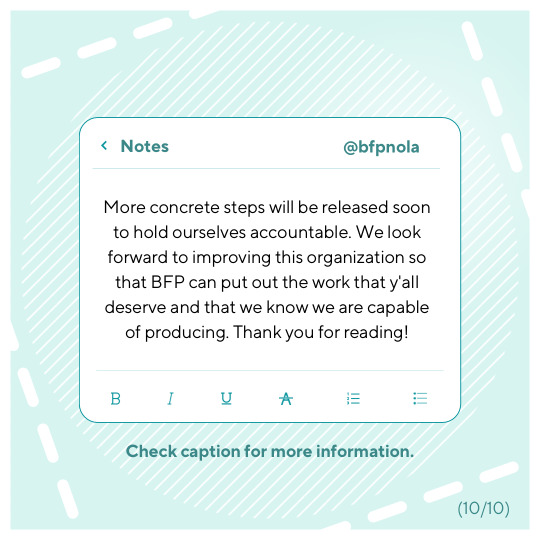
IMAGE DESCRIPTION UNDER THE CUT.
A new task force! Admittedly when we first discussed this, we were a bit upset, knowing how passionate we were to start up a new media literacy workshop for the summer. But upon further thought, honest conversations like these need to happen in every organization, ones where we admit our current capabilities and limitations so as to best protect everyone's time and energy while simultaneously continuing to fulfill our mission statement.
Further, we've already noticed a weight lifted amongst our volunteers! We utilized yesterday's Sunday meeting time to discuss BFP's history thus far, what it means to be a 501(c)(3), the nonprofit industrial complex, why we utilize a horizontal organizational structure, and then the best part? Our core beliefs! We only got to the first three (the right to organize, intersectionality, and educational equity), but the conversation was SO productive! Youth were given the chance to openly ask and answer questions with fellow activists around the globe. Even with just those three topics, we were able to cover: organizing tips, COINTELPRO, the gamification of politics, elite capture, epistemic injustice, the infantilisation faced by those at the intersection of transness and disability, equity vs equality, and accommodations in school! So much!
Next Sunday we'll continue this educational dialogue, so feel free to join us on Zoom (link available through our Discord server as well as college and career mentorship, peer support, mutual aid, private channels for marginalized communities, and the space to openly ask any social justice related questions without shame)! And once we eventually cover all of our core beliefs, BFP will officially begin designing a specific mission and timeline for this new task force, ensuring that all of us fully understand what our nonprofit stands for before making concrete decisions. Genuinely so excited to see how our little family transforms as we have already learned so much from one another in just one meeting since making this decision :)
[P.S. We do have bots in our server that can translate text messages for our non-English speakers, bots for those with dissociative identity disorder so their alters/fronts appear as different accounts with different names, bots for our nightly studying and music sessions, nonverbal emotes, and more!]
[ID: All 10 slides are a very pale mint green with a white circle made of diagonal stripes inside of a white tilted square made of thick dashes as the background. In the foreground is a white rectangle with curved edges meant to mimic an iPhone's "Notes" app with the bold, italics, underline, strikethrough, numbered list, and bullet point icons pictured at the bottom of the rectangle. Which icon is being highlighted shifts with each slide depending on the formatting of the text. At the top left corner, it reads "Notes" with a small arrow pointing left. And at the top right corner, "@bfpnola."
The slides read as follows:
"Honoring our dedication to transparency, this is BFP's current state of affairs:
Developing proper onboarding
Activity & Retention Task Force
Nonprofit Industrial Complex"
BFP was originally founded in 2016 by a team of 12 year olds in New Orleans, Louisiana. As the organization grew internationally and the work became more complex, we began to lose volunteers almost immediately as they joined. Why? We didn't have a proper onboarding process, aka a clear and efficient orientation and trainings for newcomers! As kids ourselves, none of us had entered the workforce yet so we weren't even aware that "onboarding" existed. Because of this, new hires would either become overwhelmingly confused and leave or be thrown straight into the work and burn out. As young adults now, we aim to create an efficient onboarding process and share our discoveries with other youth organizations in the future!
Due to that confusion, BFP has become incapable of hosting any more large-scale workshops, as we have failed to thoroughly prepare our newer volunteers with clarity. We owe it to those directly impacted by coercive hierarchies to do better. So, what's next for us? On 03/26, we decided to create a cross-committee Activity & Retention Task Force. This team will be dedicated to expanding our audience, maintaining the family that we've curated thus far, analyzing the success and failures of our work, and most importantly... Emphasizing BFP as a safe space for marginalized youth globally. With such a diverse team, we are always learning from one another and we'd like to continue sharing that opportunity with as many people as possible. But there's something we'd like to keep in mind!
The Nonprofit Industrial Complex. We are aware as a 501(c)(3) that organizations' radical missions can often become co-opted either by their donors or distracted by their own maintenance. If BFP ever becomes too focused on its own survival rather than that of the oppressed… We will take that needed step back. Community should always be our focus. This task force is meant to broaden youth’s access to political education and peer support, not necessarily propel BFP within the nonprofit industry. The people must come first and foremost.
More concrete steps will be released soon to hold ourselves accountable. We look forward to improving this organization so that BFP can put out the work that y'all deserve and that we know we are capable of producing. Thank you for reading! Check the caption for more information."
End ID.]
#reaux speaks#nonprofit#announcement#organizing#intersectionality#educational equity#discord#elite capture#epistemic injustice#disability justice#trans#queer#neurodivergent#youth#equity#mutual aid#dissociative identity disorder
22 notes
·
View notes
Text
"Epistemicide" is a term you should become very familiar with in all discussions regarding trans oppression.
It sounds fancier than it is. The term is related to the concept of epistemic injustice. In essence, trans people have historically been subject to a form of epistemicide: our stories, histories, testimonials, ways of life, all erased and buried to maintain the patriarchal myth of dichotomous, naturalized, immutable sex.
We are then further marginalized through epistemic injustice, prevented from participating in the processes of knowledge-production, our testimonies devalued, our voices suppressed and our identities defined for us, not by us. The perception of us shaped by others, instead of ourselves. The conversation about us dominated by the voices of those who'd rather stamp us out, shouting over us constantly.
If you're not accounting for this as a central mechanism animating transphobia, you're missing a lot of the picture.
#transfeminism#transmisogyny#transemasculation#transphobia#materialist feminism#gender is a regime#sex is a social construct#social constructionism#feminism#third sexing#degendering#regendering#heterosexuality is a regime#epistemicide#epistemic injustice
1K notes
·
View notes
Text
I'm always so fascinated by how small Palestine is. There's only 4.9 million of them in the country. The global diaspora compromise about 6 million though. It's insane that more than half its population is displaced and barred from coming home.
Israel has a population of 9.3 million, grown over 75 years of genocide, luring in settlers, and sucking on the imperial teat. They're still always so hilariously mad at Palestinians for having large families. "How can we be doing a genocide when they keep having. So. Many. Fucking. Brats??" Ostensibly because of the notion that it's the Israeli taxpayer that's supposed to support this ungrateful welfare state. Rhetoric straight out of an anti-Black fuck-them-poors Reagan dream.
Fecundity may be a deliberate way of resisting the entity hell-bent on wiping out their people. But it's also the result of factors that limit women's autonomy and sexual freedom, like poverty, reduced education infrastructure, high unemployment, religious fundamentalism, and urban and military violence. (Palestine used to be one of the most secular in the region and moved further towards religious conservativism with the escalation of Israeli terrorism.) Idk why fascists deliberately create these conditions then get mad when birth rates sky rocket.
Palestine's education system has done quite admirably though, considering it's had to struggle through Israel's chokehold. It's literacy rate is a very respectable 96.9%, tertiary education enrollment 45% and its rate of tertiary education for women one of the highest in the MENA region. The problem is women being barred from actually putting all that education to use, I'm guessing because of an economy perpetually in crisis, restricted freedom of movement, conservative gender bias and being expected to manage large families.
I can't even fathom how much more difficult things will be for Palestinians when Israel's finished with Gaza. All eleven universities have been bombed, all but a handful of hospitals still standing, along with libraries, schools, community centers, mosques, churches and targeted strikes systematically taking out the most distinguished academics, researchers, doctors, scientists, writers and artists— all its mentors and luminaries. Displacement is almost secondary to ensuring a complete cultural and epistemic genocide, that destroys not just immediate living conditions like water, food, fuel, power, shelter and medical treatment, but also all hope of emancipating and uplifting themselves through education and a knowledge economy.
#free palestine#gaza genocide#feminism#birth rate#population control#racism#apartheid#fuck israel#epistemic genocide#epistemic injustice#knee of huss
14 notes
·
View notes
Text

I meant to post this some months ago when I defended, but accidentally saved as a draft. Despite the absurd formatting requirements, I discovered we're allowed to have a frontispiece.
#philosophy#applied philosophy#studyblr#dissertation#trans philosophy#epistemology#epistemic injustice#frontispiece#holy shit they gave me a Ph.D.#no the whole thing isn't in Latin#yet
4 notes
·
View notes
Text

my first paper of my masters thesis. 🫡
Anyways, the people who have scrubbed the queerness out of history win when queer people put up their hands in defeat. When we act like we have nothing to do with the preservation and learning of queer history, we are falling into a trap that was built to slowly erode our connection to our past.
It's frustrating to see people act because queer history isn't easy to access, and there is nothing they can do. Because so so many people have spent their lives, have ruined their academic reputations, and worked tirelessly to put this information out there. Sure, it's not in every high school textbook yet, but it is reaching out waiting for you to meet it halfway. It's worth the work, I promise.
#I defend it in two-ish weeks#🏳️🌈#academia#epistemic injustice#epistemic oppression#epistemic exclusion
1K notes
·
View notes
Text
I contend that suicidal people experience both types of epistemic injustice, as well as hermeneutical marginalization. I argue that testimonial injustice is produced by interlocking sanist, suicidist and paternalist views that regard the judgment of suicidal people as irrational, incompetent, illegitimate or alienated and which destroy the suicidal subject's credibility. In that sense, suicidal people's voices are invalidated. Furthermore, as a group, suicidal people lack the conceptual tools necessary to understand their experiences outside the mainstream curative and preventative frameworks and to make them intelligible to others. As we saw above, no matter what model one uses to theorize suicidality, suicide is not considered a valid option and hence is not rendered intelligible or rational. This doesn't mean that suicidal people are not able to develop those analytical tools and don't have the capacity or agency to do so, but simply that there is a scarcity of theories, notions and concepts to help them conceptualize their experience as part of a larger system of oppression rather than an individual problem. To give an example, the fact that a suicidal person finds it difficult to reach out due to a multitude of reasons−fear of negative consequences and stigma, guilt at the idea of leaving their loved ones or "depriving" them from life insurance that doesn't apply in the case of suicide, the conviction they are being selfish or cowardly−demonstrates that it is difficult for suicidal people to conceptualize their personal experience as part of a larger oppressive system that produces violence and discrimination toward suicidal subjects. In addition, this hermeneutical injustice is partly founded on the fact that suicidal subjects experience hermeneutical marginalization. As demonstrated earlier, suicidal people are not (or very rarely) invited to contribute to knowledge construction on suicidality by either the fields of suicidology or critical suicidology. This makes the theorizing of suicidist oppression incredibly challenging for suicidal people, since no existing suicide-related discourses allow one to conceive this form of oppression.
— alexandre baril, suicidism: a new theoretical framework to conceptualize suicide from an anti-oppressive perspective (emphasis mine)
#suicidism#epistemic injustice#hermeneutical marginalization#tw sui talk#tw suicidality#anti oppression#anti psychiatry#anti psych#words words words#fountain pen#quote#quotes on tumblr
13 notes
·
View notes
Text
welcome to my little corner of the internet!
🃜🃚🃖🃁🂭🂺🃜🃚🃖🃁🂭🂺🃜🃚🃖🃁🂭🂺🃜🃚🃖🃁🂭🂺🃜🃚🃖🃁🂭🂺🃜🃚🃖🃁🂭🂺🃜🃚🃖🃁🂭🂺🃜🃚🃖🃁🂭🂺🃜🃚🃖🃁🂭
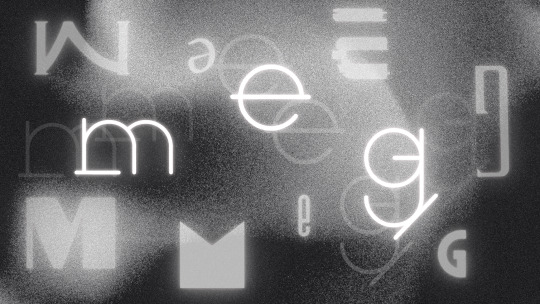
🃜🃚🃖🃁🂭🂺🃜🃚🃖🃁🂭🂺🃜🃚🃖🃁🂭🂺🃜🃚🃖🃁🂭🂺🃜🃚🃖🃁🂭🂺🃜🃚🃖🃁🂭🂺🃜🃚🃖🃁🂭🂺🃜🃚🃖🃁🂭🂺🃜🃚🃖🃁🂭🂺🃜🃚🃖
about me;
hi my name's meg! i'm currently a university sophomore pursuing a bachelor's degree in life sciences, with a track in communication!
woe to thee with fearful eyes,
their lighthouse is burning up
and down goes the ship with which you've wasted your whole lives
interests;
• critical theory
• decolonial studies
• epistemic injustice
• neoliberalization of healthcare and public health
• communication theories
• punk and goth subculture
• solarpunk aesthetic
• parasitology
and oh,
what if the world went and died,
and left you buried in regrets?
currently;
• on christmas break!
• preparing for a philosophy conference
• creating video essays
• creating my own jewelry using clay
• drawing using colored pencils
• reading:
∆ the routledge handbook of epistemology
∆ mula tore hanggang palengke
• learning:
∆ harvard principles of biochemistry MOOC for advance studying
links;
• instagram page where i post my topic interests!
#critical theory#studyblr#life science#studying#decolonization#decolonialism#decoloniality#philosophy#epistemology#epistemic injustice#biology#biochemistry#intro post#blog intro#pinned post#introduction
0 notes